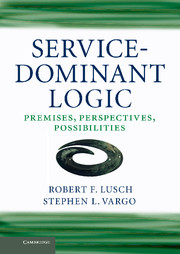10 - Conclusions and considerations
Published online by Cambridge University Press: 05 June 2014
Summary
Life is what happens to you while you’re busy making other plans.
“Beautiful Boy”, John LennonIntroduction
Service-dominant (S-D) logic is a work in progress. With the assistance of academics and practitioners we will continue to refine and develop it to create a stronger, more cohesive research tradition grounded on a core set of axioms. From the outset, we have positioned S-D logic as an evolutionary pathway moving toward a dramatically different perspective and explanation of business. The basic, underlying idea that all humans apply their competences (knowledge and skills) to benefit others and reciprocally benefit from others’ competences translates into the simple idea: service is exchanged for service. Nonetheless, as we have explored the implications of this simple idea over the past decade, we, along with others, have discovered that it has considerable potential explanatory potency; one not only applicable to micro-level, dyadic exchanges but also applicable to the meso and macro systems that emerge from these service exchanges. Perhaps predictably, we also discovered that this service-for-service exchange is not only relevant to business and economy but to society, more generally.
Convergence
The title of our first article, “Evolving to a new dominant logic for marketing,” provided a gateway to discuss a variety of trends occurring in applied business and marketing, as well as in scholarly writing and the trade literature. In Chapter 2, “Roots and heritage,” we reviewed the long history of the development of goods-dominant (G-D) logic and discussed how a variety of thoughts were converging around a new dominant logic. From the rapid ascendance and impact of the services marketing and management literature in the 1970s and 1980s, we began to see other currents of change in thinking. As is often the case, when thinking starts to change, it is supplemented or leveraged by the emergence of a new lexicon, which, in turn, further influences thinking and ultimately behavior or action. During the 1990s we witnessed such an explosion of new concepts and ways of thinking, including the following: operand and operant resources, coproduction, cocreation, mass customization, experience economy, network economy, core competency, value constellations, and value propositions.
Information
- Type
- Chapter
- Information
- Service-Dominant LogicPremises, Perspectives, Possibilities, pp. 201 - 212Publisher: Cambridge University PressPrint publication year: 2014
